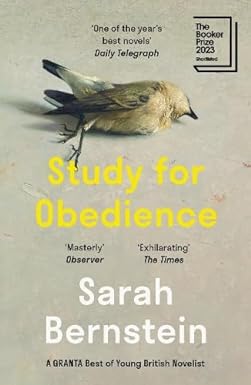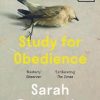Study for Obedience: Shortlisted for the Booker Prize 2023
£9.50
SHORTLISTED FOR THE BOOKER PRIZE 2023
NAMED AS ONE OF GRANTA MAGAZINE’S BEST OF YOUNG BRITISH NOVELISTS 2023
A powerful, compressed masterwork for fans of Shirley Jackson and Claire-Louise Bennett
A woman moves from the place of her birth to a remote northern country to be housekeeper to her brother, whose wife has just left him. The youngest child of many siblings – more than she cares to remember – from earliest childhood she has attended to their every desire, smoothed away the slightest discomfort with perfect obedience, with the highest degree of devotion. The country, it transpires, is the country of their family’s ancestors, an obscure though reviled people.
Soon after she arrives, a series of unfortunate events occurs – collective bovine hysteria; the demise of a ewe and her nearly-born lamb; a local dog’s phantom pregnancy; the containment of domestic fowl; a potato blight. She notices that the local suspicion about incomers in general seems to be directed particularly in her case. What is clear is that she is being accused of wrongdoing, but in a language she cannot understand and so cannot address. And however diligently and silently she toils in service of the community, still she feels their hostility growing, pressing at the edges of her brother’s property.
Inside the house, although she tends to her brother and his home with the utmost care and attention, he too begins to fall ill…
Read more
Additional information
| Publisher | 1st edition (4 April 2024), Granta Books |
|---|---|
| Language | English |
| Paperback | 208 pages |
| ISBN-10 | 1803510013 |
| ISBN-13 | 978-1803510019 |










by JCT
I really did not see the point of this book unless written with an eye to a very noir film, possibly with subtitles possibly silent. The language is interestingly stilted. The setting and indeed period indeterminate as if medieval attitudes have been installed in the present day. (Actually not that unusual but better written elsewhere). A surprise ending as I expected the narrator to come to a worse end if that were possible.
I read it because I try to read all of the Booker Long List. Others are much much better.
by AJ Brown
Strange book. Exceptionally well written and compelling prose but I seemed to be constantly trying to impose some logic and comprehension to the behaviours of the protagonist, her brother and the townspeople without much success. The novella definitely succeeds in creating an unsettling atmosphere and is undoubtedly thought-provoking but – for me, at least – it was ultimately an unsatisfactory read.
by The Reader
This is a relatively short novel and the first I have read from this author. I found it to be a cleverly written story, although the intentionally long sentences did sometimes grate a bit. However, they were indicative of the narrator’s self justifications. It could be read quite superficially, or more deeply as a testament to the Jewish ‘experience’. Although, as others have mentioned, very little actually happens, the ramping up of tension – and the little shocks as the narrator hints at abuse or incest – are really well done. The narrator herself is well realised; a great combination of false humility and cold manipulation. A slight criticism is the repetition of some words in close proximity, and the overuse of ‘stand’ to describe a group of trees, which in such a short story stood out due to there being several instances. There was also a word missing in the first few chapters. That aside, it’s a good, intriguing and satisfying read, which I recommend.
by stevros
I didn’t enjoy this book and found the narrator irritating. it’s certainly not a ‘good read’ and didn’t hold my interest.
by Pedro el Malo
Like the reviewer in “The Guardian”, this book began to pre-occupy, even obsess me, although I cannot for the life of me explain why. The prose is certainly elegant, the storyline is vague at best and indeed almost absent and some of the sentences were so tediously overlong that at times I wondered if I was reading Marcel Proust by mistake. Nevertheless, however inexplicably, I did find it difficult to put down.
by Amazon Customer
Bernstein slowly lets us learn about the main female protagonist whose perspective the story is told from. She has just moved to help her brother in his farm who lives in a country where our protagonist struggles to learn the language and is based in the North.
I found it challenging to have so few facts. Which country are we in? Why does she have to help her brother? Why does she find it hard to make friends? Why do the locals dislike her so much? It really makes you have to think, trying to pull together all of the clues and hopefully coming to the intended conclusions.
A few clues led me to decide the country and why these people reject her. If I’m correct, from reading about some legal cases about that country, I can see why the author chose this style. It really does make an impact about nations struggling to admit their collective faults for past atrocities. Though I could be mistaken!
by Amanda
A woman moves to an isolated region of a northern country to be her brother’s housekeeper. Soon, the unnamed narrator finds the habitually suspicious villagers are fearful of her and they blame her for an outbreak of catastrophes.
This is an unsettling read, which will have you questioning the narrator, and in which age-old histories jostle alongside modern communications technology.
My thanks to NetGalley and Granta Publications for the ARC.
by Helen West Cork
Bleak but characters described very well. There was an awful lot left unsaid. Another Booker nomination with subtle racism